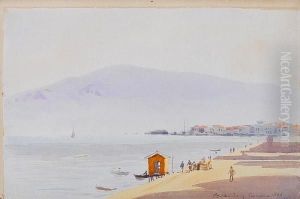Valentin Augustowitsch Feldmann Paintings
Valentin Augustowitsch Feldmann was a Russian-Soviet painter, graphic artist, and stage designer known for his diverse artistic contributions during a turbulent era in Russian history. Born on November 24, 1885, in Sankt Petersburg, Russian Empire, Feldmann's early life was set against the backdrop of a rapidly changing society, which would greatly influence his artistic development and career.
Feldmann's artistic journey began in the early 20th century, a period marked by significant social, political, and cultural shifts in Russia. He received his education at the St. Petersburg Academy of Arts, one of the most prestigious art schools in the country, where he was exposed to a variety of artistic movements and techniques. This education laid the foundation for his versatile style, which would later encompass elements of realism, impressionism, and avant-garde.
Throughout his career, Feldmann was deeply engaged with the artistic and intellectual currents of his time. He was an active participant in the vibrant cultural life of pre-revolutionary St. Petersburg and later Petrograd, contributing to various exhibitions and artistic circles. His work from this period reflects a keen interest in exploring the human condition, social injustices, and the complexities of modern life.
After the 1917 Russian Revolution, Feldmann's art took a turn as he navigated the new Soviet reality. He became involved in stage design, creating sets and costumes for theaters in Petrograd (later Leningrad) and Moscow, which allowed him to experiment with spatial composition and color. His work in theater was marked by a bold use of abstraction and an innovative approach to visual storytelling, qualities that distinguished him in the Soviet art scene.
Despite the political upheavals and artistic restrictions of the time, Feldmann continued to work prolifically until his death on October 20, 1955, in Leningrad, Soviet Union. His legacy is that of a versatile artist who managed to maintain his creative vision and integrity in the face of adversity. Feldmann's body of work, which includes paintings, graphics, and stage designs, remains an important testament to the rich cultural landscape of early 20th-century Russia and the Soviet Union.
